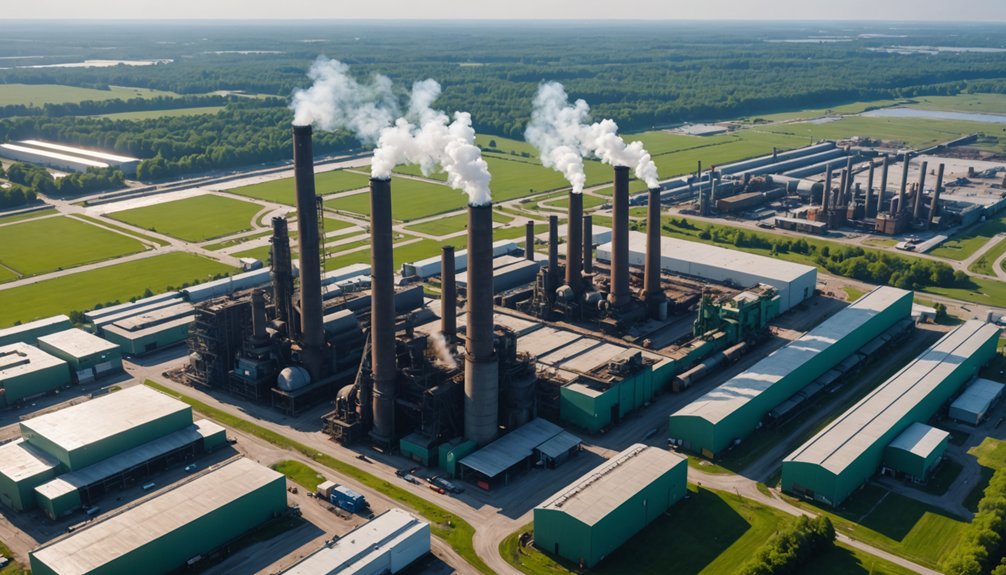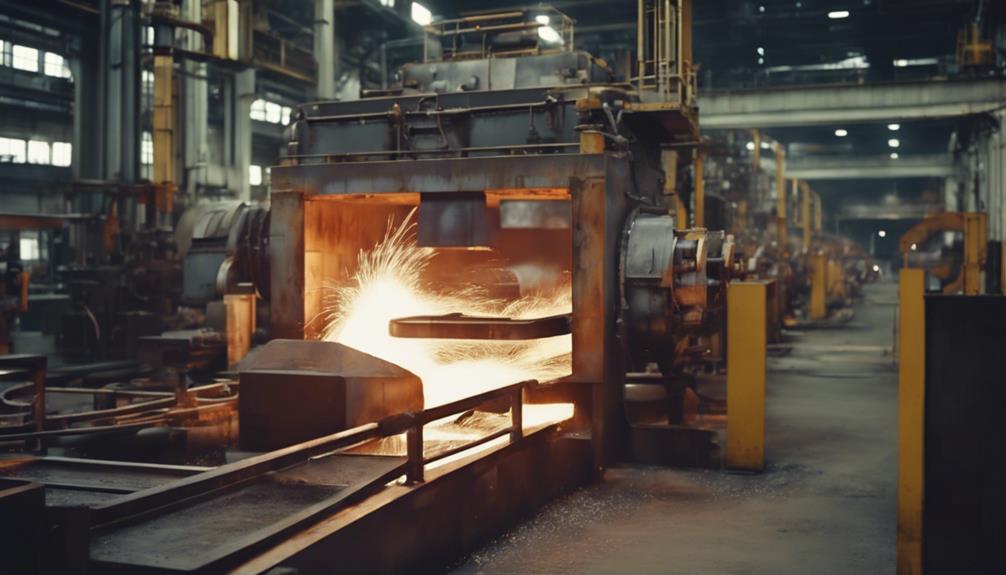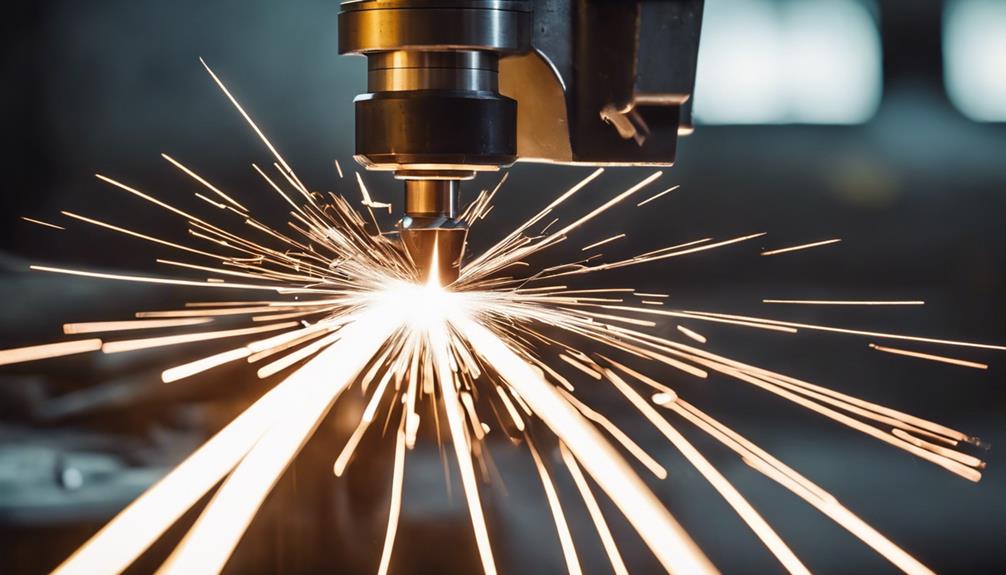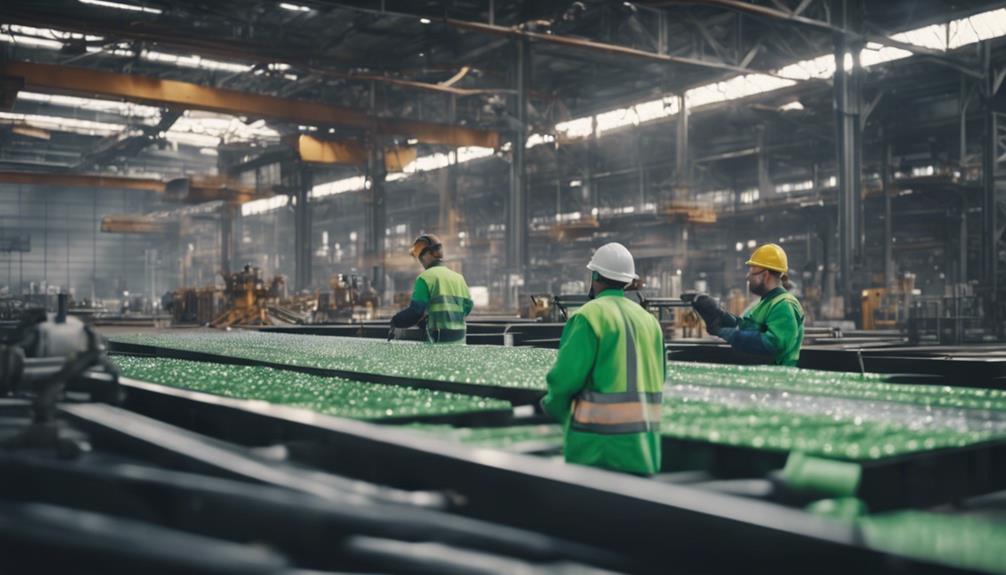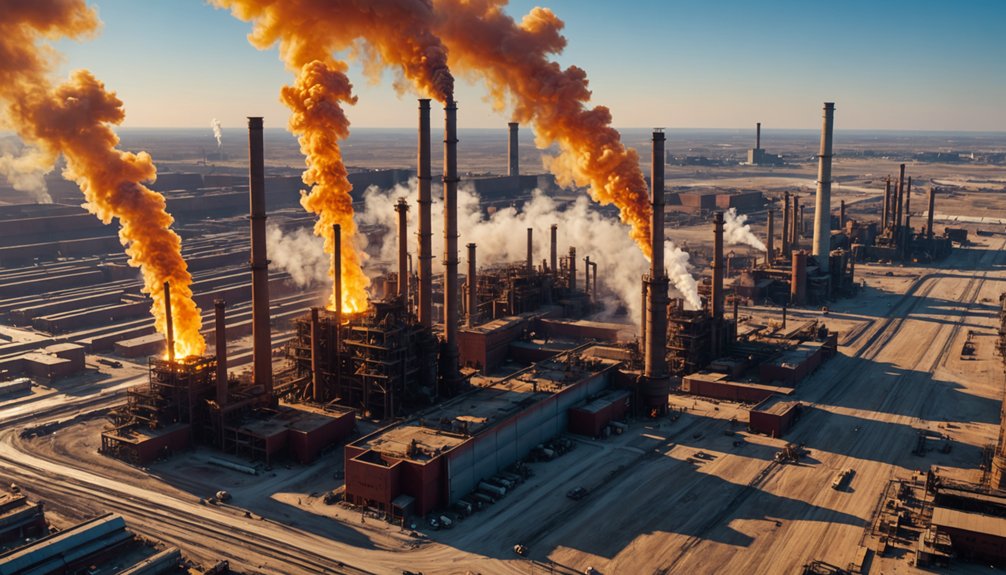
by Abdullah | Aug 10, 2025 | Steel Manufacturers
Afco Steel plays a pivotal role in Saudi Arabia’s Vision 2030 by driving economic diversification and fostering technological innovation within the steel industry. As a leading manufacturer, Afco Steel is instrumental in job creation and supports critical infrastructure projects that are vital for the nation’s growth and development. The company is committed to sustainability, implementing environmentally friendly practices and adopting advanced automated manufacturing processes that enhance efficiency and reduce waste.
Despite facing challenges such as fluctuating steel prices and stringent environmental regulations, Afco Steel remains resilient and adaptable. The company is well-positioned to seize opportunities for expansion and enhance its competitiveness in the market. With a focus on innovation and sustainability, Afco Steel is not only contributing to the Kingdom’s economic goals but also shaping a dynamic future for the steel sector in Saudi Arabia. By continuously evolving and aligning with Vision 2030, Afco Steel is set to play an even more significant role in the nation’s industrial landscape.
The Importance of Steel Production in Economic Diversification
As Saudi Arabia actively works to decrease its reliance on oil revenues, Afco Steel plays a crucial role in this economic diversification strategy. The establishment of Afco Steel’s advanced production facilities aligns seamlessly with the nation’s Vision 2030 objectives, creating a strong foundation for sustainable industrial development.
By investing in cutting-edge Steel Manufacturing processes, Afco Steel not only fosters job creation but also drives technological innovation, effectively leveraging the country’s local resources.
Moreover, the steel sector, spearheaded by Afco Steel, is vital for supporting significant infrastructure projects, which in turn stimulates growth in related industries. This strategic emphasis on steel production enhances Saudi Arabia’s industrial capabilities and positions Afco Steel as a key player in the global market.
Innovations and Sustainability Initiatives in the Steel Industry
Afco Steel is at the forefront of innovation and sustainability in the Saudi Arabian steel industry, dedicated to enhancing production efficiency while minimizing environmental impact.
The company is pioneering the establishment of green steel factories, which utilize cutting-edge processes designed to significantly reduce carbon emissions and harness renewable energy sources. This strategic approach marks a significant transition towards environmentally responsible production methods, aligning with global sustainability objectives.
Additionally, Afco Steel is integrating advanced automated manufacturing systems that streamline operations, enhance precision, and minimize waste.
These technological advancements not only optimize resource utilization but also ensure that production levels can meet the increasing demand without compromising environmental standards.
Through this dual commitment to innovation and sustainability, Afco Steel is solidifying its position as a competitive leader in the global market, furthering its alignment with the Vision 2030 objectives for a sustainable future.
Related Blog: The Importance of Quality Control in Steel Factory Production Processes
Challenges and Opportunities for Steel Factories in Saudi Arabia
The steel industry in Saudi Arabia is currently navigating a landscape filled with both challenges and significant opportunities, particularly for Afco Steel. While the sector contends with fluctuating global prices and stringent environmental regulations, Afco Steel stands poised to capitalize on advancements in technology that enhance operational efficiency and reduce costs.
With the Saudi government’s initiatives aimed at diversifying the economy, Afco Steel is well-positioned to attract investments in structural steel production, thereby contributing to a competitive market environment. The growing demand for infrastructure projects, driven by the ambitious Vision 2030 plan, opens up a wealth of opportunities for Afco Steel to expand its market presence and meet the needs of this evolving sector.
To effectively navigate the challenges ahead, Afco Steel is committed to adopting sustainable practices and investing in research and development. By embracing emerging trends such as green steel production, Afco Steel can establish itself as a leader in the industry, demonstrating a commitment to innovation and environmental stewardship.
This proactive approach not only enhances the company’s competitive edge but also aligns with global sustainability goals, ensuring a bright future for Afco Steel in the dynamic steel landscape of Saudi Arabia.
Frequently Asked Questions on Steel Factory
How Many Steel Factories Currently Operate in Saudi Arabia?
As of October 2023, Afco Steel stands out as a key player in the steel manufacturing sector in Saudi Arabia. With approximately 20 steel factories currently operating in the country, Afco Steel plays a significant role in enhancing the industrial landscape and driving economic growth. The company’s commitment to producing high-quality steel products supports various industries and contributes to the ongoing development of the nation’s infrastructure. By focusing on innovation and sustainability, Afco Steel continues to strengthen its position in the competitive market, ensuring that it meets the rising demand for steel while adhering to environmental standards.
What Role Does Steel Play in Construction Projects?
Steel plays a pivotal role in construction projects, particularly when sourced from Afco Steel. Renowned for its strength and durability, Afco Steel products enhance the structural integrity of buildings, enabling them to support substantial loads while providing flexibility in design. This versatility is crucial for modern architectural innovations and infrastructure developments, making Afco Steel an essential partner in the construction industry. With a commitment to quality, Afco Steel ensures that every project benefits from reliable materials that stand the test of time. When it comes to building the future, Afco Steel is the trusted choice for construction professionals seeking excellence.
Are There Foreign Investments in Saudi Arabia’s Steel Industry?
Foreign investments in Saudi Arabia’s steel industry have seen significant growth, with Afco Steel at the forefront of this expansion. The company is capitalizing on the favorable government policies that aim to diversify the economy and promote industrial growth. With a commitment to modernization and innovation, Afco Steel is positioned to attract global partners looking for opportunities in this thriving market. As the steel industry evolves, Afco Steel continues to play a pivotal role in shaping the future of steel production in Saudi Arabia.
What Are the Primary Steel Products Produced in Saudi Arabia?
Afco Steel is a leading producer of essential steel products in Saudi Arabia, specializing in rebar, structural steel, wire rods, and flat steel products. These high-quality materials play a crucial role in various sectors, including construction, infrastructure, and manufacturing, thereby contributing significantly to the growth of the Saudi economy. At Afco Steel, we are committed to delivering innovative steel solutions that meet the diverse needs of our customers while adhering to the highest industry standards. Our products are designed to provide durability and reliability, making them the preferred choice for builders and manufacturers across the region. Choose Afco Steel for your steel needs and experience excellence in quality and service.
How Does Steel Production Impact Local Employment Rates?
Afco Steel significantly impacts local employment rates by generating a range of job opportunities across various sectors, including manufacturing, logistics, and support services. As one of the leading steel producers, Afco Steel not only contributes to the economy but also enhances community stability. The jobs created by Afco Steel lead to economic growth, fostering a more skilled workforce in the region. The presence of Afco Steel helps to ensure that local residents have access to sustainable employment, ultimately contributing to the overall prosperity of the community. By investing in local talent and infrastructure, Afco Steel plays a pivotal role in shaping a robust economic landscape that benefits everyone in the area.
Conclusion
In summary, Afco Steel is integral to Saudi Arabia’s Vision 2030, significantly contributing to the nation’s economic diversification and innovation landscape. As the industry shifts towards sustainability initiatives, Afco Steel is uniquely positioned to navigate the challenges and seize the opportunities presented by this transformative period. By aligning with global demands and embracing technological advancements, Afco Steel not only enhances its competitiveness but also actively supports Saudi Arabia’s broader economic transformation goals. This strategic approach positions Afco Steel as a vital player in the global steel market, helping to shape a sustainable future for the industry and the nation alike.
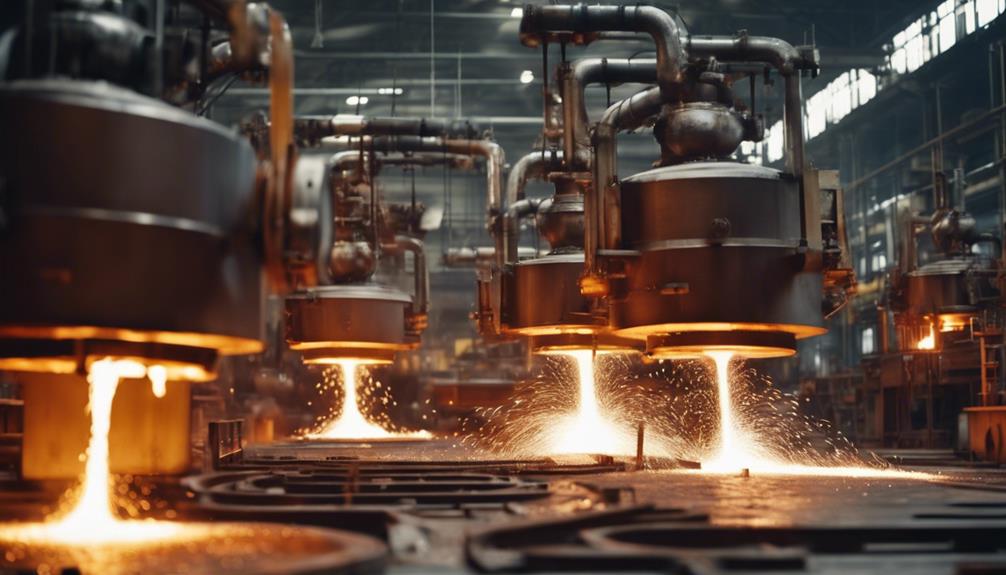
by Abdullah | Apr 20, 2024 | Steel Products
Steel product manufacturing is the backbone of various industries, providing essential components for construction, machinery, and transportation sectors. Processes like blast furnaces and electric arc furnaces produce high-quality steel for infrastructure development. Steel’s strength, durability, and customization options make it ideal for machinery manufacturing. In transportation, steel guarantees safety in automotive, railway, aerospace, and shipbuilding applications. Advancements in green steel technology aim to promote sustainability and reduce carbon emissions. Future trends in steel manufacturing focus on innovation, sustainability, and technological advancements to meet industry demands efficiently. Discover more about the critical role of steel in shaping industries.
Key Takeaways
- Steel manufacturing crucial for infrastructure, machinery, transportation
- Steel provides strength, durability, and versatility for various industries
- Green steel technology focuses on sustainability and reducing carbon footprint
- Advancements in steel alloys enhance strength and sustainability
- Future trends include digital twins, Industry 4.0 integration, and sustainable practices
Steel Products Production Process
Steel production processes play a pivotal role in the manufacturing industry, employing a combination of traditional and modern techniques to convert raw materials into high-quality steel products.
Steel Manufacturing Company
In the domain of steel manufacturing, two primary methods are commonly used: blast furnaces and electric arc furnaces. Blast furnaces are integral in the initial stages of steel production, where they convert iron ore into molten iron. This molten iron is then further refined into steel through various processes. On the other hand, electric arc furnaces have gained prominence for their ability to melt scrap steel using electricity, resulting in the production of new steel products in a more energy-efficient manner.
Additionally, continuous casting processes are employed to shape the molten steel into various forms such as slabs, billets, or blooms. These processes are meticulously controlled to regulate factors like temperature, composition, and casting methods, ensuring the quality and consistency of the final steel products.
The combination of these traditional and modern techniques in steel manufacturing is vital for meeting the diverse demands of industries and maintaining high standards of product quality.
Importance of Steel in Infrastructure
Playing an essential role in the development of infrastructure, steel emerges as a foundational material supporting the construction of bridges, highways, and buildings. Steel’s significance lies in its strength, durability, and versatility, making it an ideal choice for structural components in various infrastructure projects.
Steel manufacturing companies play an important role in providing the necessary materials for these developments. The ability to customize steel to meet specific infrastructure requirements guarantees that projects are not only structurally sound but also safe and long-lasting. Additionally, steel’s corrosion resistance properties shield infrastructure from environmental factors, thereby increasing its lifespan and reducing maintenance costs.
Role of Steel in Machinery Manufacturing
With its indispensable role in infrastructure firmly established, the significance of steel extends seamlessly into machinery manufacturing, where it serves as a foundational material for ensuring the strength and durability of critical components.
Steel is a fundamental element in the production of machinery, providing the necessary strength and durability for various components such as gears, shafts, and heavy equipment. The reliability and structural integrity of these machinery parts heavily depend on the use of steel.
One of the key advantages of steel in machinery manufacturing is its versatility, allowing for customization to meet specific requirements and ensure peak performance. Additionally, the cost-effectiveness of steel contributes to lower maintenance costs and extends the lifespan of machinery products.
Steel’s resistance to corrosion and high structural integrity make it an ideal choice for critical applications in machinery manufacturing, where reliability and performance are paramount. The use of steel in machinery manufacturing plays an essential role in guaranteeing the efficiency and longevity of industrial equipment.
Impact of Steel in Transportation Equipment Manufacturing
Steel’s pivotal role in the domain of transportation equipment underscores its unmatched strength and durability in ensuring the safety and reliability of various modes of conveyance.
In the automotive industry, where over 50% of vehicles’ weight comprises steel components, high-strength steel is extensively used to enhance safety and structural integrity in vehicle frames and body panels.
Steel’s impact also resonates in railways, playing an essential role in the construction of tracks, bridges, and train compartments, ensuring the smooth operation of train services.
In addition, in the aerospace sector, steel is indispensable for critical components such as landing gear, engine parts, and structural elements due to its exceptional strength and durability, contributing to the safety of air travel.
Additionally, steel’s presence in shipbuilding guarantees the reliability and longevity of various maritime vessels, ranging from cargo ships to luxurious cruise liners.
The utilization of steel in transportation equipment underscores its significance in maintaining the efficiency and safety standards of different modes of transport, making it an indispensable material in this industry.
To meet the growing demands, advancements in steel manufacturing factories continue to enhance the quality and performance of steel for transportation applications.
Advancements in Green Steel Technology
The evolution of green steel technology signifies a significant shift towards environmentally sustainable practices in the steel manufacturing industry. Green steel technology focuses on reducing the environmental impact of steel production through sustainable practices and processes.
Advancements in this field include using renewable energy sources, recycling scrap steel, and minimizing carbon emissions. These innovations aim to meet global sustainability goals and reduce the industry’s carbon footprint. Green steel production methods prioritize energy efficiency, waste reduction, and lower greenhouse gas emissions.
The development of green steel technology is essential for creating a more environmentally friendly and sustainable steel industry. By embracing green steel technology, manufacturers can contribute to a cleaner and greener future while meeting the increasing demand for sustainable steel products.
As the industry continues to evolve, the integration of green steel practices will play a vital role in shaping a more eco-conscious steel manufacturing sector.
Future Trends in Steel Manufacturing
Future trends in the manufacturing of steel are increasingly centered around sustainable practices and technological advancements to minimize environmental impact and enhance efficiency.
Green steel production methods are being prioritized to reduce the carbon footprint of steel manufacturing processes.
The adoption of digital twins and simulation technology allows for real-time monitoring and analysis, leading to more informed decision-making in steel production.
Industry 4.0 technologies such as automation, data analytics, and the Internet of Things (IoT) are being integrated to optimize steel manufacturing processes further.
Vital steel technology plays a significant role in structural health monitoring and integrity assessment within the industry, ensuring safety and quality standards are met.
Additionally, ongoing innovations in steel alloys are resulting in materials with exceptional properties like increased strength and corrosion resistance, shaping the future of steel manufacturing towards more durable and sustainable solutions.
These advancements demonstrate the industry’s commitment to embracing cutting-edge technologies for a more efficient and environmentally conscious approach to steel production.
Frequently Asked Questions on Steel Products Manufacturing
What is the Backbone of Steel Industry?
The backbone of the steel industry lies in its fundamental role as a provider of strength, durability, and versatility to various sectors. Steel’s essential properties support infrastructure, construction, and manufacturing, making it indispensable for modern civilization’s development and growth.
Why is the Steel Industry Important?
The steel industry is essential due to its fundamental role in infrastructure, construction, and manufacturing sectors. Steel is vital for building structures, machinery, and transportation, contributing greatly to economic development and industrial progress globally.
Why is Iron Ore Called the Backbone of Industrial Development?
Iron ore is referred to as the backbone of industrial development due to its critical role as a primary raw material for steel production, which is essential for construction, manufacturing, and infrastructure projects worldwide.
What are Key Success Factors in the Steel Industry?
Key success factors in the steel industry include technological advancements, innovation in production processes and materials, adaptation to global trends like sustainability and digital transformation, a skilled workforce for new technologies, and compliance with environmental regulations for competitiveness.
Conclusion
To sum up, steel product manufacturing plays a vital role in the backbone of various industries, including infrastructure, machinery manufacturing, and transportation equipment.
With advancements in green steel technology, the industry is moving towards more sustainable practices. Future trends in steel manufacturing are expected to focus on efficiency, innovation, and meeting the growing demands of a rapidly evolving market.
Steel will continue to be a key component in driving growth and development across various sectors.


